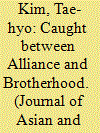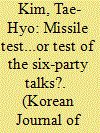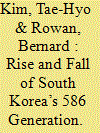| Srl | Item |
| 1 |
ID:
050935


|
|
|
| 2 |
ID:
078645


|
|
|
|
|
| Publication |
2007.
|
| Summary/Abstract |
A cost-benefit analysis leads to the conclusion that South Korea's search for non-violent responses to the North Korean nuclear issue causes a dilemma for Seoul. It must balance its security policies toward Washington and Pyongyang, and that dilemma can be resolved only when the North Korean nuclear problem, the most critical and the most difficult hurdle, is resolved. In analyzing critical variables that will determine the success or failure of the six-party talks multilateral approach, this article challenges the central tenet of cooperation theories: if a sufficient number of countries collaborate, they can achieve preventive diplomacy. Cooperation to dismantle the North Korean nuclear program will be difficult due to backsliding (`sanction busting') by concerned countries
|
|
|
|
|
|
|
|
|
|
|
|
|
|
|
|
| 3 |
ID:
153513


|
|
|
|
|
| Summary/Abstract |
Since the conclusion of the Comfort Women Agreement (December 2015) and the
General Security of Military Information Agreement (November 2016), it has been
widely believed that Japan–South Korea relations have hit bottom and begun to
rebound. How soon and how much they will recover depends on the Japanese and
South Koreans themselves. Can the people of Japan and South Korea escape the
fetters of the past? Can the two countries have as much security cooperation as the
United States desires? This paper argues that the recent development in Japan–ROK
relations provides little hope that the two countries will be freed from their historical
yoke as the two governments have wished. Sincere reconciliation on history
between America’s two essential Asian allies will be impossible for several decades
because domestic politics in both countries rewards nationalistic approaches to
Japan–ROK relations. In its policy toward East Asia, the Trump administration will
face the same dilemma as did its predecessors as long as Japan–South Korea history
disputes widen the mismatch in the two countries’ policy priorities toward China
and North Korea, a problem that is beyond U.S. control.
|
|
|
|
|
|
|
|
|
|
|
|
|
|
|
|
| 4 |
ID:
083357


|
|
|
|
|
| Publication |
2008.
|
| Summary/Abstract |
By reviewing the development of relations between the Republic of Korea (ROK) and Japan up to the present, since Korea was liberated from Japan's colonial rule, the author will show that changes in the security environment have gradually raised the importance of ROK-Japan security cooperation. South Korea and Japan, both allied to the United States, shared the common goal of defending their society from the communist threat, but their dedication to democratic values was not imminent enough to outweigh their past history. After the demise of the Soviet threat in Northeast Asia, the rationale for South Korean-Japanese security cooperation is to be found in their joint contribution to handle comprehensive security threats in the region, including the issues of weapons of mass destruction, terrorism, confidence-building, environmental and energy security, etc. The future of the South Korean-Japanese relationship depends on whether the two sides can build a future-oriented relationship as they move to remedy the past. ROK-Japan relations, the weakest link of the trilateral security relations among the United States, Korea, and Japan, may not override the importance of the Korea-U.S. and the U.S.-Japan alliances due to the geostrategic conditions that confine Korean and Japanese foreign policy. Nevertheless, their common views of democracy and the market economy will continue to bind them together throughout the twenty-first century.
|
|
|
|
|
|
|
|
|
|
|
|
|
|
|
|
| 5 |
ID:
073631


|
|
|
| 6 |
ID:
189034


|
|
|
|
|
| Summary/Abstract |
Washington’s biggest concern in its relationship with South Korea has been returning to a stance consistent with active engagement in the Indo-Pacific region. In response to June 2020 remarks by a senior South Korean official that his country had the right to choose between the US and China, the US State Department commented that South Korea had already chosen the US several decades ago when it abandoned authoritarianism and embraced democracy.Footnote1 In October 2021, although Washington officially welcomed the declaration of an end to the Korean War—a proposal that had been promoted for several years by the Moon Jae-in administration—the Biden administration expressed de facto opposition by insisting that it be linked to tangible North Korean denuclearization measures.
|
|
|
|
|
|
|
|
|
|
|
|
|
|
|
|